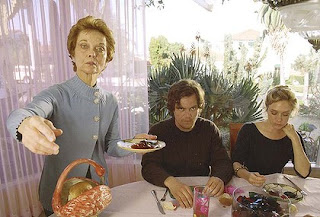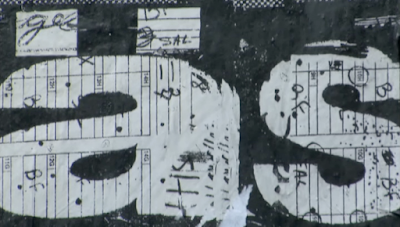
Last night at
Bears the attending audience (and by that I mean Raina, Chris, the projectionist and myself) were treated to a
Guillermo del Toro double feature:
Pan's Labyrinth and
The Orphanage. It was an excellent excuse to drink hot toddies and eat cheese fries, but it was also an excellent pairing of two of the director's best films. In a fairly significant lapse of attentiveness on my part, I had failed to notice previously how intricately these two movies overlap one another. Both tales of motherhood, madness, and murder,
Pan's Labyrinth and
The Orphanage are films that continue to amaze me in their ability to affect the feeling of total peaceful resolution with endings that cannot be read as anything but profoundly tragic. We watched
Pan's Labyrnith first, for which I was grateful as without it fresh in my mind I don't think I could have left
The Orphanage with the same level of satisfaction that I had last night. The protagonist, Ofelia, is so name not solely to frame each scene with the inevitability of the young girls death (the visual with which del Toro frames the film); it seems rather that the whole film is a re-staging of Hamlet in Franco's Spain. The film has all the elements of
Hamlet (the clear the usurpation of a rightful father by an ambitious political criminal), but retold from Ophelia's perspective. Ofelia is young, virginal, plagued by coming sexual maturity, and driven by external pressures to retreat into a fantasy world, a kind of madness. Pan is the film's Hamlet, the eponymous hero whose half-love, half-cruelties, and gaming half-truths contribute to the overwhelming instability of the world Ofelia inhabits. Pan is the perfect figure to stand in as Hamlet;
his relationship with Selene in classical literature is one of seduction, as we read in some texts he's know not only for bedding shepherdesses, but for mercilessly hunting those who rejected him. The shift of the narrative to Ophelia's perspective is an interesting choice on del Toro's part, and sets the stage for what appears to be the dominant theme of the movie: the systematic victimization of women. Pan's Labyrinth is very clear: women are uniformly abused, by structures domestic and political, biological and narratological. Examples of this are inescapable; at home women suffer under the boot of a domestic tyrant, in war women are unable to fight openly, and in narrative action is centered around female sacrifice, of a woman to madness, love, or politics, of mothers at the hands of their children (the film offers us two examples: both Ophelia and her mother die to save her brother). The art direction brilliantly reflects these themes in Ofelia's book, where the intricate appearance of forest figures and Pan's face always follow the same pattern as the later painting of her mother's blood soaked ovaries and uterus.
This ongoing exploration of women and sacrifice is inverted in
The Orphanage, where a mother sacrifices her son and seek to redeem themselves for their wrongdoing. For all its beautiful cultivation of a horror aesthetic,
The Orphanage is the same tale as
Pan's Labyrinth: a woman's retreat from the horrors of reality into her own fantasy world. I know many would argue that it is not until the very final conclusion that Laura is confronted with the knowledge that she locked her son in a basement to die. I wholeheartedly disagree. After discovering the truth about Tomas, Laura watches a film of the young boy drawing in his basement cell. She sees living footage that proves the house has a level she has never seen--that the basement in which Tomas lived, the place her son begged her to visit just before his disappearance, exists just below her. Never once does she attempt to find its entrance in an effort to seek out her son. Even after finding the doorknob to the basement, a doorknob that perfectly matches the first floor closet, she explores every door and space in the house except the closet. Laura knows, but isn't yet ready to confront what she's done. Instead, Laura adopts Beninga's clothing (thus identifying herself with a murderer who locked her son in the basement) and Simon's coping mechanism (she retreats into a world of imaginary friends, eventually writing herself in to the novel her son reads upon their first arrival at their new home).
The Orphanage is only the story of a haunting in as much as Laura is haunted by her conscience, in every other way it's like
Pan's Labyrinth--a story of the fragile line that divides fantasy and madness.
I love both of these movies, though I left the double feature feeling that del Toro's project fell short of what it could have done. Much of
Pan's Labyrinth feels to me as though it's interested in critiquing from a feminist perspective the role women play in myth and classical literature. But ultimately, in both films the moral that women must sacrifice or be sacrificed prevails. Their deaths are tragic, but they're also beautiful, satisfactory, and deeply necessary. Watching them back to back was a little like reading Poe's short stories and poems all in one go--after a while you suspect the author lives in a world where all the beautiful women are dead and the landscape is just brimming with ominous aged hags and young men dedicated to the full time occupation of calculating and lamenting their losses. With both of these movies del Toro participates in a grand tradition of mythic story-telling, and he does it very very well. His critiques of the genre, however, unravel slightly in his deeply traditional endings. Tradition is what carries the pieces. Like the original Grimm tales, both movies are terrifying. Like most folkloric traditions, both are extremely beautiful. [
Photo: I don't want to claim that Pan's Labyrinth is full of visual ovarian metaphors, but once it occurs to you it's impossible to see anything else.]























